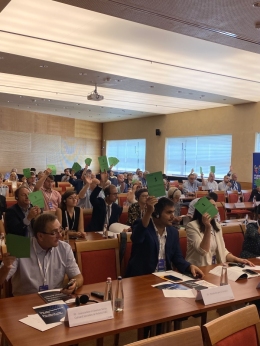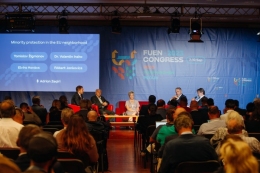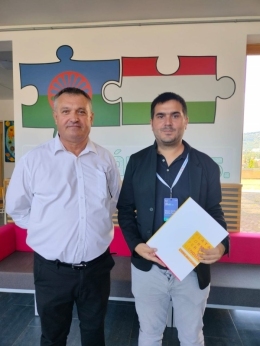The Federal Union of European Nationalities has unanimously approved a resolution from Plataforma per la Llengua calling on Spain to recognise Catalan speakers as a language minority and to include them as a beneficiary of the Council of Europe's Framework Convention for the Protection of National Minorities. At the moment, the State protects only the Roma population, as it is the only one it recognises as a minority. The resolution was approved in Pécs as part of the 67th Congress of this international organisation - one of the main agents protecting national and language minorities. Head of International Affairs Òscar-Adrià Ibàñez, attended on behalf of Plataforma per la Llengua.
The resolution, worked out between the organisation and FUEN's executive board, deplores the fact that the Spanish State denies the existence of linguistic minorities and that, due to this lack of recognition, they are losing speakers, while at the same time it is easier for new inhabitants of the territories where these languages are spoken to learn Spanish, which becomes the lingua franca. Although the State considers it has no national minorities and protects only the Roma people, the special rapporteur of the United Nations for minorities concluded in 2020, after visit to the area, that Catalan speakers are, indeed, a minority in Spain. Plataforma per la Llengua has already explained this, in a report made after his visit. Italy is currently the only State that recognises the Catalan speakers in its territory as a language minority.
In order to reverse this situation, the resolution makes four requests to the Spanish authorities: that they include Catalan speakers as a protected group in the Council of Europe's Framework Convention for the Protection of National Minorities; that they recognise the language and national minorities of the State as minorities; that they develop a tool for statistical monitoring of the vitality of languages; and, finally, that they carry out a comprehensive census of minorities based on statistics making it possible to discover speakers' language uses and preferences, as well as their feelings of belonging or self-identification.
The benefits for Catalan speakers of being recognised as a language minority in Spain
Recognition of Catalan speakers as a language minority by the Spain and their inclusion as a protected group in the Council of Europe's Framework Convention would allow them various benefits. To begin with, inclusion would make the protection of the language subject to another international control mechanism, similar to that of the ECRML, with an independent advisory committee that visits States, issues assessments, collects the States' comments and adopts resolutions to guide them, as well as making recommendations on how to improve the language's status.
Inclusion in this framework agreement would also force States to promote the conditions for maintaining the language or to give explanations as to why this is not being done. It would also give speakers the right to be informed via media in Catalan, including funding for private media outlets if necessary. The protection would also cover the right to study in this language, which would benefit the Catalan speakers of the Franja de Ponent (a Catalan-speaking territory bordering Catalonia but located in the Spanish region of Aragon). This international treaty goes against rules that limit the use of Catalan or impose Spanish and establishes a right for all language minorities to deal with all authorities in their own language (Catalan speakers currently cannot use their own language to communicate with the authorities based in Madrid). In this sense, it would provide the Spanish State with a monitoring tool so it can ensure that medical staff, judges and police officers are able to work in Catalan.
Resolutions passed in favour of minorities in Ukraine, Austria and Greece
The FUEN Assembly of Delegates has also resolved to call for stronger protection mechanisms for minorities in the European Union and for the Council of Europe to improve its control mechanisms for any breaches of the ECRML or the Framework Convention for the Protection of National Minorities. It will also ask the European Union to use the Strasbourg Court to allow members of national minorities protection against European breaches, and the Organisation for Security and Cooperation in Europe (OSCE) to cooperate more with minority associations.
The Assembly of Delegates also resolved to urge the authorities to improve the protection of minorities in Ukraine and the Slovenian minority in Austria; to recognise traditional Turkish minorities in Greece; and to encourage the return of the Meskhetian Turks to Georgia.
First vote by Platform for the Language as an associate member at a congress where it has been able to get to know the Roma minority in Hungary
The Assembly of Delegates of the 67th FUEN Congress was the first in which Platform for the Language was able to vote as an associate member, after its inclusion was approved a year ago in Berlin. The organisation had already been part of FUEN as a supporting member since 2018, but this did not allow it to vote in the Assembly of Delegates. Associate membership is a preliminary step to being admitted as an ordinary member, which will have to wait at least one more year, but which will allow Plataforma per la Llengua to have up to six votes at the annual Assembly of Delegates.
As well as the Assembly of Delegates, the Congress also included lectures and outings that made it possible to get to know the Croatian, German and Roma minorities in Hungary. Along with other members of the Non-Kin State working group, Plataforma per la Llengua visited the Gandhi Gimnázium State secondary school, the first institution for the Roma population in Europe, where secondary education is based on the common Hungarian curriculum, the classical arts, and the Roma oral tradition to give young people from the Roma national minority in Hungary better opportunities.
The Federal Union of European Nationalities (FUEN) is the main protector of national minorities and indigenous language groups in Europe, and includes more than 100 organisations from 36 European States. The organisation began in Versailles in 1949 to provide different nations and minorities with a proper role after the Second World War, and it has recently coordinated initiatives such as the Minority Safepack, a Europe-wide legislative initiative to improve protection for minorities. FUEN is currently the voice of national, ethnic, linguistic and religious minorities in international organisations such as the Organisation for Security and Cooperation in Europe (OSCE) and the United Nations, where it has consultative status. The organisation also has participatory status in the European Union and the Council of Europe.






